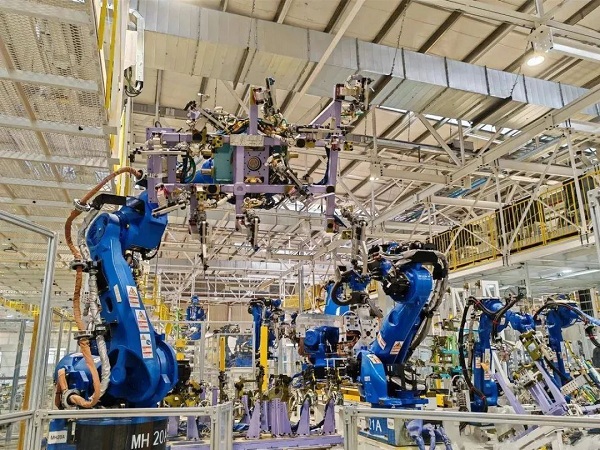

Dongfeng Honda's factory in the Wuhan Economic and Technological Development Zone (WEDZ). [Photo provided to en.whkfq.gov.cn]
In 2023, the gross output value of industries above a designated size in the Wuhan Economic and Technological Development Zone (WEDZ) exceeded 360 billion yuan ($50.15 billion), accounting for nearly a quarter of the Wuhan's total and maintaining its position as the top contributor to the city's industrial output.
The Neusoft South China R&D Base, with a total investment of 3 billion yuan, is set to be completed in April. It will focus on areas such as automotive electronics, healthcare, and smart cities. It will also support and strengthen research and development in core technologies, such as big data, artificial intelligence, and blockchain.
Once completed, it will become a key entity in the Wuhan Intelligent Automotive Software Park as well as a vital hub for enhancing the zone's software core competitiveness.
Just under two kilometers away, the first phase of the China Electronics Cloud Research Base (CECloud research base) has been completed, with a total investment of 5 billion yuan.
Meanwhile, construction on Dongfeng Honda's first pure electric and intelligent factory is in its final stages. Once completed, it will produce Honda's new e:N series electric vehicles (EVs). Inside the workshop, spot welding robots, arc welding robots, and gripping robots are already in place. "Based on the trial production requirements, these robots are undergoing joint testing, and can assemble a car in just 90 seconds," said a worker at the factory.

Two customers test drive a VOYAH production model. [Photo provided to en.whkfq.gov.cn]
On Feb 1, VOYAH announced that 7,041 of its new vehicles were delivered in January, a 355-percent year-on-year increase. Last year, WEDZ accelerated the transformation and upgrading of enterprises related to new energy vehicles (NEVs), adding a production capacity of 200,000 NEVs.
This year, the zone is striving to achieve an automobile output of 1.2 million units, with NEVs set to surpass 400,000.